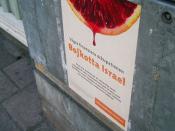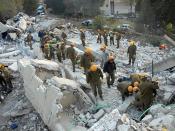Agriculture
The Land
The climate of Israel is mostly arid and semi-arid. Approximately twenty percent, or 4,370 sq. km., of Israel's land is fit for cultivation. A large portion of the area is forested and hilly, thus, not fit for agriculture. The land that is arable stretches along the coast as well as some inland valleys.
Approximately half of the arable land has to be irrigated because of Israel's lack of water resources, eighty percent of which uses a combination of irrigation and fertilization techniques. (Israel Agritech, 1999) Consequently, the Israeli people have had to overcome much adversity to make their land productive. November through April is considered Israel's rainy season, producing approximately 20-25 inches in the north and less than one half inch in other areas.
Industries
Agriculture makes up five percent of Israel's GNP. Among Israel's agriculture industries are dairy farming, poultry farming, field crops, citrus fruits, vegetables, biotechnology, irrigation, fertilizers and pesticides.
Many of these industries exist because of the size of Israel. With having such a small area in which to use, products produced must be of excellent quality. Irrigation is very important with such little rainfall present. Scientists are continuously trying to maximize the use of their land. Irrigation plays a large role in determining the use of the land. Fertilizers improve the quality of the soil, increases yield and increases the quality of the crops. Pesticides help to ensure that the plants will not be eaten by insects.
Biotechnology plays a part in both the dairy and poultry farming industries. The Israeli people are forever trying to maximize their dairy and poultry genetic potential as they too have a small amount of land to use. They have made their poultry population highly resistant to disease and very tolerant of a hot climate. Additionally, the...


